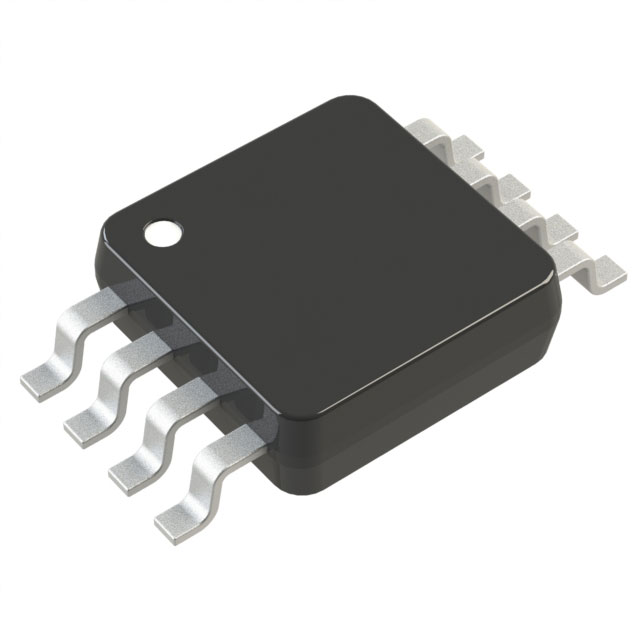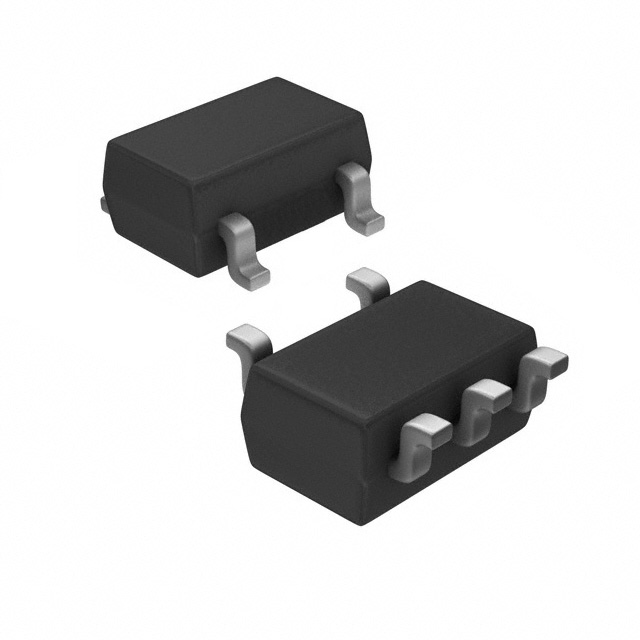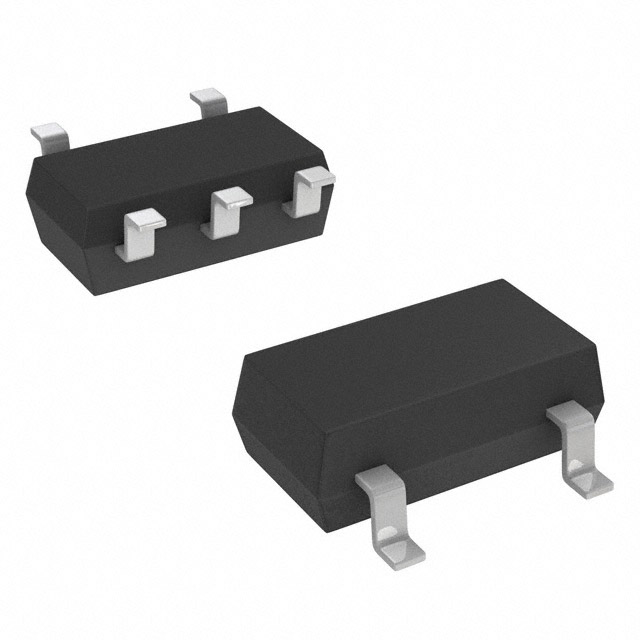featured products

3PEAK
PRECISION OPERATIONAL AMPLIFIER,
$0.9
4600 available

3PEAK
INSTRUMENTATION AMPLIFIER, 8-SOP
$2.44
5596 available

3PEAK
INSTRUMENTATION AMPLIFIER, 8-SOP
$2.5
5600 available

3PEAK
CURRENT SENSING AMPLIFIER, 8-SOP
$2.66
5600 available

3PEAK
PRECISION OPERATIONAL AMPLIFIER,
$1.25
4584 available

3PEAK
HIGH SPEEDOPERATIONAL AMPLIFIER,
$0.51
5524 available

ABLIC
IC CMOS 2 CIRCUIT 8TMSOP
$0.53
5600 available

ABLIC
IC OPAMP ZERO-DRIFT 2CIRC 8TMSOP
$1.97
5600 available

ABLIC
IC RTC CLK/CALENDAR I2C SNT8A
$0.75
18339 available

ABLIC
IC COMPARATOR 2 CMOS 8TMSOP
$0.35
1600 available

ABLIC
IC CMOS 1 CIRCUIT SOT23-5
$0.37
8802 available

ABLIC
IC OPAMP GP 1 CIRCUIT SC88A
$0.37
1600 available
Technology and News

Main Application Fields of the ISO1050DUBR Driver
The ISO1050DUBR, a high-performance isolated CAN transceiver integrated circuit launched by Texas Instruments (TI), has found widespread application across multiple industries due to its impressive performance parameters and extensive functionalities. Designed specifically to tackle challenges in harsh industrial environments, this driver integrates various protection mechanisms to ensure reliable operation under extreme conditions.
In the field of industrial automation, the ISO1050DUBR plays a crucial role. Within industrial control systems, it achieves isolation between digital and analog signals, effectively protecting the system from electrical interference and damage, thereby enhancing system reliability and stability. This isolation function is vital for preventing noise currents on the data bus or other circuits from entering the local ground and interfering with or damaging sensitive circuits. Therefore, the ISO1050DUBR has become an indispensable component in industrial automation.
The ISO1050DUBR also excels in the field of power electronics. In various power electronic devices, it can be used not only for isolating control signals but also for isolating power devices from control circuits, thus protecting electronic equipment and improving system efficiency. With an electrical isolation capability of up to 2500VRMS, as well as protection functions against overvoltage, overcurrent, and overheating, the ISO1050DUBR effectively safeguards connected equipment from high-voltage surges.
The electric vehicle sector is another significant application area for the ISO1050DUBR. In the electric drive systems of electric vehicles, it can be used to isolate communication signals between motor control signals and battery management systems, ensuring safety and reliability among subsystems. This is crucial for enhancing the overall performance and safety of electric vehicles.
Furthermore, the ISO1050DUBR is widely used in digital communication systems within power systems, such as serial bus communication, data acquisition, and control signal isolation. Its compliance with ISO 11898-2 standards and support for CAN bus transmission rates of up to 1Mbps make it highly efficient and reliable for applications in power systems.
In the field of instrumentation, the ISO1050DUBR also plays an important role. In measurement and control systems of various instruments, it can be used to isolate sensor signals, control signals, and data communication signals, ensuring the accuracy and stability of measurements and controls. This is significant for improving the performance and reliability of instrumentation.
In addition to the above fields, the ISO1050DUBR is also applied in numerous other sectors, including medical equipment, building and HVAC (Heating, Ventilation, and Air Conditioning) automation, security systems, transportation, and telecommunications. Its outstanding performance parameters and extensive protection functions make it a leader in CAN bus communication systems in these fields.
Overall, with its high performance, high isolation capabilities, and comprehensive protection functions, the ISO1050DUBR has found wide application in industrial automation, power electronics, electric vehicles, power systems, instrumentation, medical equipment, and more. Its emergence has not only improved system performance and reliability in these fields but has also injected new vitality into the development of related industries. As technology continues to advance and application fields expand, the ISO1050DUBR is expected to play an even greater role in more sectors.

Analysis of Market Demand for Digital Isolator ADM2582EBRWZ
Digital isolators, serving as crucial components in modern electronic systems, undertake multiple tasks such as signal isolation, circuit protection, and system stability enhancement. Among them, the ADM2582EBRWZ digital isolator from Analog Devices has occupied an important position in the market due to its outstanding performance and wide range of applications. This article will delve into the current market demand for the ADM2582EBRWZ digital isolator, analyzing the driving factors behind it and future trends.
I. Current Market Demand
In recent years, with the rapid development of emerging technologies such as industrial automation, intelligent manufacturing, and the Internet of Things (IoT), the market demand for digital isolators has shown a trend of rapid growth. The ADM2582EBRWZ, as a high-performance digital isolator, enjoys particularly vigorous market demand. This is mainly attributed to its excellent electrical isolation performance, high-speed data transmission capabilities, and comprehensive protection functions, making it widely used in various industrial control, communication equipment, and power systems.
In the field of industrial control, digital isolators isolate circuits of different voltage levels to prevent system crashes caused by electrical interference or faults. The ADM2582EBRWZ, with its high isolation voltage (up to 2500Vrms) and high-speed data transmission rate (up to 16Mbps), plays a crucial role in industrial automation systems, significantly enhancing system reliability and stability.
In the field of communication equipment, digital isolators isolate digital and analog signals, preventing signal interference and noise interference, thus improving communication quality. The ADM2582EBRWZ integrates safety functions such as overvoltage protection and short-circuit protection, making it safer and more reliable for use in communication equipment.
Moreover, in power systems, digital isolators are widely used in data acquisition, control signal isolation, and fault protection. The ADM2582EBRWZ's high common-mode transient immunity and thermal shutdown protection features enable it to operate stably in complex power environments, providing robust support for the safe operation of power systems.
II. Driving Factors of Market Demand
Technological Advancements: Continuous technological development has provided technical support for the performance enhancement and cost reduction of digital isolators. The emergence of high-performance digital isolators such as the ADM2582EBRWZ is an important manifestation of technological advancements driving market demand growth.Industrial Automation and Intelligent Manufacturing: The rapid development of industrial automation and intelligent manufacturing has placed higher requirements on the performance, accuracy, and reliability of digital isolators. High-performance digital isolators such as the ADM2582EBRWZ can meet these requirements, becoming important supports in the fields of industrial automation and intelligent manufacturing.Proliferation of IoT Technology: The widespread adoption of IoT technology has expanded the application scenarios of digital isolators in smart homes, intelligent transportation, smart healthcare, and other fields. High-performance digital isolators such as the ADM2582EBRWZ can ensure the stability and security of signal transmission in IoT systems, driving the rapid development of IoT technology.Policy Support: Governments have provided policy support for technological innovation and industrial upgrading, encouraging enterprises to increase R&D investments and enhance product technology levels. This has created a favorable policy environment for the development of the digital isolator industry, promoting market demand growth.III. Future TrendsLooking ahead, with the continued promotion and application of emerging technologies such as Industry 4.0 and the IoT, the market demand for digital isolators will continue to grow rapidly. Meanwhile, as market competition intensifies and technology continues to advance, the performance of digital isolators will continue to improve, costs will decrease, and application fields will expand.
For high-performance digital isolators such as the ADM2582EBRWZ, future market trends will include:
Technological Innovation: With continuous technological advancements, the performance of digital isolators will continue to improve, such as higher isolation voltages, faster data transmission rates, and stronger protection functions. This will further expand the application fields of digital isolators, meeting the needs of more complex scenarios.Cost Reduction: As market competition intensifies and the effects of large-scale production become apparent, the cost of digital isolators will continue to decrease. This will enable digital isolators to be widely used in more fields, driving the rapid development of the entire industry.Integrated Applications: With the continuous development of IoT, big data, artificial intelligence, and other technologies, digital isolators will deeply integrate with other technologies to form smarter, more efficient, and safer electronic systems. This will bring new development opportunities and challenges for digital isolators.In summary, the ADM2582EBRWZ digital isolator demonstrates strong growth momentum in market demand. With continuous technological advancements and market expansion, its application prospects will become broader. At the same time, facing intense market competition and technological challenges, enterprises need to continuously enhance their strength, strengthen technological innovation and quality management, and adapt to market changes to seize development opportunities.

Technical Features of PMIC DC-DC Switching Regulator TPS54202DDCR
TPS54202DDCR is a high-performance DC-DC switching regulator from Texas Instruments (TI), belonging to the PMIC (Power Management Integrated Circuit) series. This device, with its extensive functional characteristics and excellent performance, is highly favored in power management applications. This article will delve into the technical features of TPS54202DDCR to provide readers with a better understanding and application of this product.
TPS54202DDCR is a 2A synchronous buck converter with an input voltage range of 4.5V to 28V. This means it can handle input voltages from 4.5V to 28V and deliver a maximum current of 2A. This wide input voltage range makes it suitable for various applications, such as 2V and 24V distributed power bus supplies, audio equipment, STBs (Set-Top Boxes), DTVs (Digital Televisions), and other consumer appliances.
TPS54202DDCR integrates two switching FETs (Field-Effect Transistors) and features internal loop compensation and a 5ms internal soft-start function. These features significantly reduce the number of external components, simplify circuit design, and enhance system reliability and stability. With a SOT-23 package, TPS54202DDCR achieves high power density while occupying minimal space on the printed circuit board (PCB), making it ideal for applications with stringent space requirements.
Another notable feature of TPS54202DDCR is its advanced Eco-mode. This mode maximizes light-load efficiency and reduces power loss through pulse-skipping technology. This characteristic makes TPS54202DDCR particularly outstanding in applications with high energy efficiency requirements, such as battery-powered devices.
To reduce electromagnetic interference (EMI), TPS54202DDCR incorporates spread-spectrum operation. By adjusting the switching frequency, spread-spectrum operation effectively lowers EMI and improves the system's electromagnetic compatibility. This is crucial for applications that need to meet strict electromagnetic compatibility standards.
TPS54202DDCR also boasts multiple protection features to ensure stable system operation. Cycle-by-cycle current limiting on the high-side MOSFET protects the converter from overload conditions and prevents current runaway. Additionally, freewheeling current limiting on the low-side MOSFET further enhances protection capabilities. If the overcurrent condition persists beyond a preset time, TPS54202DDCR triggers hiccup mode protection to further safeguard the circuit.
TPS54202DDCR also features overvoltage protection and thermal shutdown functions. These functions automatically shut down the converter when the voltage is too high or the temperature is too high, thereby protecting the system from damage.
TPS54202DDCR operates at a switching frequency of 500kHz, which is relatively high and helps reduce the size of the output capacitor and improve the system's dynamic response performance. The optimized internal compensation network further simplifies the design of the control loop and reduces the number of external components.
In conclusion, TPS54202DDCR showcases exceptional performance in power management applications due to its wide input voltage range, high power density, advanced Eco-mode, spread-spectrum operation, multiple protection features, and optimized internal compensation network. These features make TPS54202DDCR an ideal choice for designing efficient and reliable power management systems.

STM32F030K6T6: A High-Performance Core Component for Embedded Systems
In today's digital era, microcontrollers serve as the heart of embedded systems, playing a pivotal role across various sectors. They are extensively utilized in medical devices, automotive electronics, industrial control, consumer electronics, and communication equipment. Among these microcontrollers, STM32F030K6T6 stands out due to its high performance, low power consumption, and abundant peripheral interfaces. This article delves into the technical features, application fields, and the significance of STM32F030K6T6 in modern electronic systems.
STM32F030K6T6, a microcontroller from STMicroelectronics, belongs to the STM32F0 series and is based on the ARM Cortex-M0 core. It integrates a high-performance ARM Cortex-M0 32-bit RISC core running at up to 48 MHz, providing robust data processing capabilities. Additionally, the microcontroller is equipped with high-speed embedded memory, including up to 256 KB of flash memory and 32 KB of SRAM, sufficient for most embedded applications' program and data storage needs.
STM32F030K6T6 boasts a diverse range of peripheral interfaces, including multiple I2C, SPI, and USART communication interfaces, as well as a 12-bit ADC, seven general-purpose 16-bit timers, and one advanced control PWM timer. These peripheral interfaces facilitate communication and control with external devices, making STM32F030K6T6 well-suited for various complex embedded application scenarios.
Low power consumption is another highlight of STM32F030K6T6. Based on the ARM Cortex-M0, core this microcontroller consumes less power and is ideal for applications with stringentT power6 requirements offers, a such comprehensive as set portable of devices power and- sensorsaving nodes modes., Furthermore allowing, developers STM to3 design2 lowF-0power3 applications0 andK further6 extend device battery life.
In terms of packaging, STM32F030K6T6 comes in various package forms, ranging from 20 pins to 64 pins, catering to different applications' packaging size and pin count requirements. This flexibility enables STM32F030K6T6 to be widely used in various space-constrained embedded systems.
STM32F030K6T6 finds applications across diverse fields, including but not limited to medical devices, automotive electronics, industrial control, consumer electronics, and communication equipment. In medical devices, STM32F030K6T6 can be used in wearable health monitors and portable medical equipment, providing precise data processing and reliable communication functions. In automotive electronics, it can be utilized in electronic control units (ECUs), in-vehicle infotainment systems, and body control systems, enhancing vehicles' intelligence and safety. In industrial control, STM32F030K6T6 controls industrial automation equipment, sensor nodes, and robots, enabling efficient and precise automated production. In consumer electronics, it can be found in household appliances, smart home devices, and electronic toys, enhancing products' intelligence and user experience.
Moreover, STM32F030K6T6 benefits from STMicroelectronics' extensive development tools and documentation support. These tools include compilers, debuggers, simulators, and more, providing developers with comprehensive support from design to debugging. The availability of these resources enables developers to undertake projects more quickly and efficiently, reducing development costs and time.
In summary, as a high-performance microcontroller, STM32F030K6T6 stands out with its powerful processing capabilities, abundant peripheral interfaces, low power consumption, and flexible packaging options, playing a crucial role in embedded systems. Whether in medical devices, automotive electronics, or industrial control, STM32F030K6T6 demonstrates exceptional performance and broad application prospects. With the continuous development of the Internet of Things (IoT) and artificial intelligence technologies, STM32F030K6T6 will continue to lead the trend of embedded system development in the future, bringing more convenience and intelligence to our lives.

Analyzing the Key Features of the STM32F407VGT6 Microcontroller
The STM32F407VGT6, a high-performance microcontroller introduced by STMicroelectronics, is based on the ARM Cortex-M4 core and widely utilized in various high-performance embedded systems. Its robust functionalities and flexible design make it a significant choice for industrial control, robotics, audio processing, and other domains. Below, we delve into the primary features of the STM32F407VGT6.
1. Powerful Computing Performance
The STM32F407VGT6's core is the ARM Cortex-M4, renowned for its efficient processing capabilities and low power consumption. With a maximum clock frequency of 168MHz, it swiftly handles complex computational tasks. This enables the STM32F407VGT6 to excel in applications requiring high-speed computations, such as audio signal processing and advanced control algorithms.
2. Abundant Memory Resources
In terms of storage, the STM32F407VGT6 boasts 1MB of Flash memory and 192KB of SRAM, providing ample space for multitasking and large program storage. Whether running sophisticated operating systems or storing vast amounts of data, the STM32F407VGT6 can easily accommodate these needs.
3. Diverse Peripheral Interfaces
The STM32F407VGT6 features a wide array of peripheral interfaces, including 82 GPIO (General-Purpose Input/Output) pins, 6 USARTs (Universal Synchronous/Asynchronous Receiver/Transmitter), 3 SPIs (Serial Peripheral Interface), 2 I2Cs (Inter-Integrated Circuit bus interfaces), and more. Additionally, it possesses 3 12-bit ADCs (Analog-to-Digital Converters), 2 CAN (Controller Area Network) interfaces, and a USB 2.0 Full-Speed interface (supporting both device and host modes). These peripheral interfaces enable the STM32F407VGT6 to seamlessly connect with various sensors, actuators, and external devices, facilitating complex data acquisition and control functionalities.
4. Efficient Development Toolchain
The STM32F407VGT6 supports multiple development environments, including STM32CubeMX, STM32CubeIDE, and Keil MDK-ARM. These tools offer powerful debugging capabilities and optimized code generators, assisting developers in quickly getting started and efficiently progressing with their projects. STM32CubeMX is used for peripheral configuration, clock tree setup, and generating initialization code; STM32CubeIDE is an integrated development environment that supports code writing, debugging, compiling, and programming; while Keil MDK-ARM is suitable for more advanced embedded development.
5. Low-Power Design
While delivering high performance, the STM32F407VGT6 also emphasizes low-power design. It supports multiple low-power modes, allowing flexible power consumption adjustment based on application requirements. This makes the STM32F407VGT6 exceptional in battery-powered devices, extending their operational time.
6. Versatile Application Scenarios
With its powerful performance and rich peripheral interfaces, the STM32F407VGT6 is suitable for diverse application scenarios. In industrial control, it can implement complex control algorithms and data acquisition functions; in robotics, it can serve as the core processor for control systems; in audio processing, it provides high-quality audio input and output; furthermore, it can be applied in smart homes, IoT, and other fields, enabling interconnectivity between devices.
In summary, the STM32F407VGT6, with its powerful computing performance, abundant memory resources, diverse peripheral interfaces, efficient development toolchain, low-power design, and versatile application scenarios, stands out as an ideal choice for high-performance embedded system development.

Understanding the chip burning process: interface selection, tool usage, and common problem solving
The basic principle of chip burning is to burn the interface. Chip burning is usually carried out through the following interfaces: JTAG: Joint Test Action Group interface, used for debugging and programming. SWD: Serial Wire Debug interface, used for debugging and programming. ISP: In System Programming interface, used for direct programming on circuit boards. I2C: Inter Integrated Circuit interface used for data transmission. SPI: Serial Peripheral Interface interface, used for data transmission. Common chip burning tools include hardware burners such as ST Link, J-Link, AVR ISP, etc., which are used to connect chips and computers through physical interfaces. Software burning tools, such as STM32Cube Programmer, AVRDUDE, OpenOCD, etc., are used to write and execute burning commands. The basic process of chip burning includes: connecting the burner to the chip and computer through appropriate interfaces; Select the model and parameters of the target chip in the burning tool; Load the program code or data files that need to be burned into the burning tool; Set burning parameters, such as address range and burning speed; Start the burning process and write program code or data into the chip; After the burning is completed, verify whether the data in the chip is correct.
TP5532-VR
TPA1286-SO1R
TPA1286U-SO1R
TPA1295F-SO1R-S
TPA1881-TR
TPH2502-SR
S-19610AB0A-K8T2U
S-19630AB0A-K8T2U
S-35390A-I8T1U
S-89240BC-K8T2U
S-89431ACMC-HBVT2U
S-89431ACNC-HBVTFG
S-89431BCPH-H4DTFU
ASNT5070
ASNT7113A-KHC
ASNT7113A-KMC
ALD1701APAL
ALD1701BPAL
ALD1701BSAL
ALD1701GSAL
ALD1701PAL
ALD1702ASAL
ALD1702BPAL
ALD1702BSAL
ALD1702PAL
ALD1703SAL
ALD1704APAL
ALD1704ASAL
ALD1704BPAL
ALD1704BSAL
ALD1704PAL
ALD1704SAL
ALD1706APAL
ALD1706ASAL
ALD1706BSAL
ALD1706SAL
ALD1712APAL
ALD1712BPAL
ALD1712SAL
ALD1721GPAL
ALD1721PAL
ALD1722GSAL
ALD1722PAL
ALD1722SAL
ALD1726SAL
ALD1731SAL
ALD1732ASAL
ALD1736APAL



